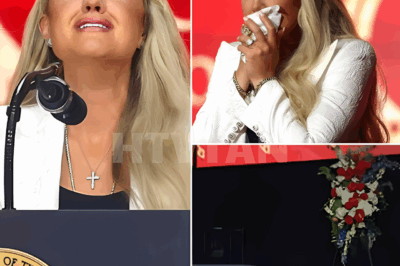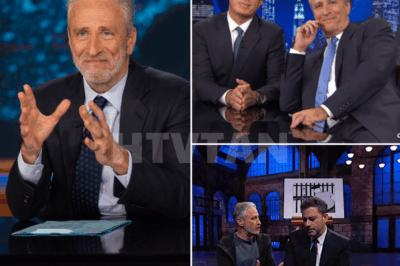Will Cain Fires Back: A Fiery Rebuttal to Jimmy Kimmel’s Controversial Remarks Sparks National Debate
In a moment that has captivated the nation, Fox News host Will Cain delivered a blistering on-air rebuttal to late-night comedian Jimmy Kimmel, igniting a fierce debate that has reverberated across media outlets and living rooms alike. Cain’s response came after Kimmel made remarks that many perceived as deeply insensitive, particularly in the wake of the sudden and tragic death of conservative commentator Charlie Kirk.
The exchange, which unfolded during a segment on The Will Cain Show, not only spotlighted the deep political and cultural fault lines dividing the country, but also raised questions about the responsibilities of public figures when speaking on matters of national grief. Cain’s words—“Go to hell”—reverberated with a raw emotional intensity, setting the stage for what many are calling a defining moment in the culture war.
The Backdrop: Charlie Kirk’s Death and Kimmel’s Controversial Monologue
The confrontation stems from the shock surrounding Charlie Kirk’s untimely passing at a public campus event in Utah. Kirk, the founder of Turning Point USA, was a polarizing but influential conservative figure, often speaking on college campuses and in political forums. His sudden collapse and subsequent death sparked reactions across the political spectrum—from heartfelt condolences to inappropriate memes and politicized mockery.
In the days following the tragedy, Jimmy Kimmel addressed the news during his opening monologue on Jimmy Kimmel Live! Rather than offering condolences or a moment of reflection, Kimmel made a passing joke that critics say trivialized the death and mocked Kirk’s ideological positions even in death.

“Some people drown in their own rhetoric,” Kimmel quipped, a line that was met with both laughter and visible discomfort in the audience.
The comment quickly spread online and sparked a firestorm, with many accusing Kimmel of mocking a man’s death and politicizing a tragedy for laughs. In a moment where national unity might have been called for, Kimmel’s joke became the catalyst for an eruption of outrage.
Will Cain’s Fiery Response
Will Cain, never one to shy away from cultural controversy, unleashed a passionate rebuttal on his show just 24 hours after Kimmel’s monologue aired.
“On behalf of the people who believe in decency, who believe in respecting the dead—even those we disagree with—I’d like to say to Jimmy Kimmel: Go to hell.”
Cain’s voice trembled with fury, expressing what many conservatives—and even some centrists—had been feeling: that Kimmel’s comment crossed a moral line. But Cain didn’t stop there. His response was more than personal outrage—it was a cultural indictment.
“This isn’t about Charlie Kirk anymore,” Cain said. “This is about a media class so insulated, so morally bankrupt, that they can’t even pause the punchlines for five seconds when someone dies.”
A Polarizing Moment: Public Reaction
Cain’s fiery monologue split the country—much like the issue that triggered it. Supporters praised him for saying what no one else would, with social media lit up by hashtags like #CancelKimmel and #RespectTheDead. Many saw his takedown as a defense of basic human decency in a media culture increasingly defined by partisanship and cruelty.
“Finally, someone stood up,” one user posted on X. “You don’t have to agree with Kirk’s politics to know he didn’t deserve that kind of send-off.”
However, critics of Cain’s remarks argued that his language was inflammatory and did little to encourage civil discourse. Progressive commentators accused Cain of grandstanding, using outrage over a comedian’s bad joke as a political cudgel.

Still, even some of Kimmel’s fans admitted the moment felt off-tone.
“We love Jimmy,” one viewer posted. “But that line about Kirk? That wasn’t funny. It was mean. And it undermined everything he stands for.”
The Bigger Picture: When Media Loses Its Moral Compass
Beyond the initial blow-up, the exchange has sparked a broader national conversation about the role of media personalities during times of tragedy.
Kimmel, long known for blending comedy with progressive politics, has walked a fine line between satire and activism. But his Kirk comment has many asking: When does satire become cruelty?
In Cain’s view, it already has.
“It’s not about free speech,” Cain added. “You’re allowed to say what you want. But don’t be surprised when the rest of the country starts tuning you out because you’ve lost touch with your own humanity.”
Comedy, Culture, and the Politics of Grief
Kimmel’s defenders argue that his comments were taken out of context, and that his monologue was meant to highlight Kirk’s history of incendiary rhetoric. But even so, the moment raises uncomfortable questions about how we handle the deaths of controversial figures in a deeply divided nation.

Should public figures like Kimmel exercise more restraint in moments of collective grief? Or is satire still a valid tool to critique—even in death—those who shaped public life in divisive ways?
Cain’s answer is clear: there’s a line, and Kimmel crossed it.
The Culture War’s New Front Line
This incident is just the latest flare-up in a culture war that’s increasingly being fought on late-night stages and political talk shows.
Jimmy Kimmel, once a go-to voice for emotional honesty and progressive causes, now finds himself alienating part of his audience. Meanwhile, Will Cain—a former ESPN analyst turned political powerhouse—has cemented his role as a defender of red-state America’s cultural values.
The exchange underscores the growing divide between elite media voices and everyday Americans, many of whom feel their grief, faith, and values are routinely mocked by a class of entertainers who don’t share or understand their lives.
What This Means for the Future of Political Commentary
In an age when every word is instantly amplified—and weaponized—this moment serves as a stark reminder: tone matters.

Cain’s outburst may have been blunt, even crude—but it struck a nerve because it came from a place of sincerity. Kimmel’s joke, however calculated, felt cold and out of step.
The media, now more fragmented than ever, must grapple with how to balance freedom of expression with a sense of shared decency—especially during moments of tragedy.
Conclusion: A Flashpoint in a Divided America
The clash between Will Cain and Jimmy Kimmel is more than a media spat—it’s a symbol of deeper fractures in the American cultural and moral landscape.
Cain’s response tapped into a growing sentiment that mainstream media and Hollywood figures are detached from the values of millions of Americans. Kimmel’s critics argue that he crossed a line. His defenders say he spoke uncomfortable truths.
But one thing is certain: this moment will be remembered.
Not just as a media controversy, but as a turning point in how we treat each other in the aftermath of loss, and what we expect from those with the biggest microphones in the room.
News
NFL EARTHQUAKE  : Patrick Mahomes Erupts With Explosive Fury at Jimmy Kimmel, Dropping a Bone-Chilling Vow That Shakes the League, Stuns Fans Worldwide, and Leaves the Future of Football Hanging by a Thread
: Patrick Mahomes Erupts With Explosive Fury at Jimmy Kimmel, Dropping a Bone-Chilling Vow That Shakes the League, Stuns Fans Worldwide, and Leaves the Future of Football Hanging by a Thread
The NFL has always been a theater of gladiators, where sweat, blood, and unshakable determination collide under blinding lights and…
BREAKING: Nexstar, ABC’s largest affiliate, REFUSES to air Jimmy Kimmel on its network. Nexstar Media Group announced that it will continue to suspend “Jimmy Kimmel Live!” when it returns to nighttime.
BREAKING: Nexstar, ABC’s largest affiliate, REFUSES to air Jimmy Kimmel on its network. Nexstar Media Group announced that it will…
SAD NEWS: Charlie Kirk’s Widow Erika Collapses Moments After Memorial — Rushed to Hospital as Hidden Grief Takes a Devastating Toll The cameras were off. The guests had left. The flowers were being taken down. But just as the final echoes of Charlie Kirk’s memorial faded from the air, his wife, Erika Kirk, suddenly collapsed to the ground — unconscious. Paramedics were called immediately, and she was rushed to the emergency room in what sources are calling a “severe physical and emotional crash.” Insiders say Erika has been battling extreme grief, insomnia, and emotional exhaustion since Charlie’s tragic death — holding herself together for the public, only to break the moment she was finally alone. Her current condition is being closely monitored, and family members have requested privacy — but supporters across the country are already flooding social media with prayers and concern. What caused the collapse? How long had she been silently suffering? And is there more to the story the public never saw? Full medical update and family statement — unfolding here 
SAD NEWS: Erika Kirk Collapses After Husband’s Memorial Phoenix, Arizona — The atmosphere at the Turning Point USA memorial for Charlie…
“BUT PASSION NEVER GOES OUT OF STYLE.” – Derek Hough STUNS Piers Morgan With 6-Word Comeback That SILENCED an Entire Studio Live on Air It started with a smirk. A few jabs. And then, Piers Morgan went for the throat — mocking Derek Hough on live television, calling him “a relic of dance shows past” and accusing him of “selling nostalgia to stay relevant.” At first, Hough didn’t flinch. But then came the silence. The lean forward. The stare. And finally, six words that stopped everything: “But passion never goes out of style.” No one laughed. No applause. No cue cards. The audience froze. Even Morgan blinked — speechless. It wasn’t a performance. It wasn’t drama. It was one man reclaiming his art — and the dignity they tried to take from him. What happened next off-camera? Why did producers cut to black seconds later? The moment, the meaning, and the full clip that’s now breaking the internet — watch it here 
Derek Hough Silences Piers Morgan With Six Words That Froze Live TV September 24, 2025 When Piers Morgan tried to…
“WHAT A JOKE! F ABC” – Jon Stewart ERUPTS ON LIVE TV, Publicly Humiliates ABC Over Jimmy Kimmel’s SHOCK FIRING in a Rant That Left the Entire Studio Frozen… What Happened Next Was Even More Shocking Viewers were left stunned and speechless as Jon Stewart unleashed a raw, unscripted tirade on live television — tearing into ABC executives just minutes after the network’s bombshell decision to fire Jimmy Kimmel. With cameras rolling and producers scrambling, Stewart looked directly into the lens and said the words that would set social media ablaze: “What a joke!” What followed was a full-blown on-air meltdown that no one — not even the studio crew — saw coming. But what was behind his rage? Was this truly about Kimmel, or is Stewart exposing something far darker about the late-night industry? As rumors swirl of power plays, betrayal, and a fractured network behind the scenes, many now believe this could be the beginning of a much bigger war. The truth about Kimmel’s firing — and Stewart’s brutal response — might be far more personal than anyone imagined. The full uncut breakdown is here 
“Is Jon Stewart’s Explosive Takedown of ABC News the Breaking Point for Media Integrity? This Shocking Scandal Could Redefine Journalism…
“I DON’T NEED YOUR MONEY — I WANT JUSTICE FOR MY MAN.” – Molly McNearney SHAMES ABC Execs by REFUSING Their ‘Charity Payout’ and Redirecting It to the Staff Jimmy Kimmel Fought For In a move that insiders say “left the room dead silent,” Molly McNearney, Emmy-nominated producer and wife of Jimmy Kimmel, has officially rejected a payout offered by ABC during the indefinite shutdown of Jimmy Kimmel Live! — and what she did next has turned Hollywood on its head. “This isn’t about pity. It’s about principle,” she said in a leaked internal email now circulating across the entertainment industry. Instead of cashing the check, Molly demanded it be redirected to the writers, crew members, and staff left jobless by the sudden cancellation — people she said “Jimmy loved like family.” But this isn’t just about a paycheck. It’s a direct shot at Disney’s carefully curated corporate image, and an act of open rebellion from someone who knows how the system works — and just exposed its cracks. What did ABC execs say in response? And what’s next for Molly, now hailed as the voice ABC never expected to fear? Full email leak + Hollywood’s stunned reaction — right here 
In a stunning act of solidarity and defiance, Molly McNearney, the executive producer and co-head writer of Jimmy Kimmel Live!, delivered…
End of content
No more pages to load







Leave a Reply